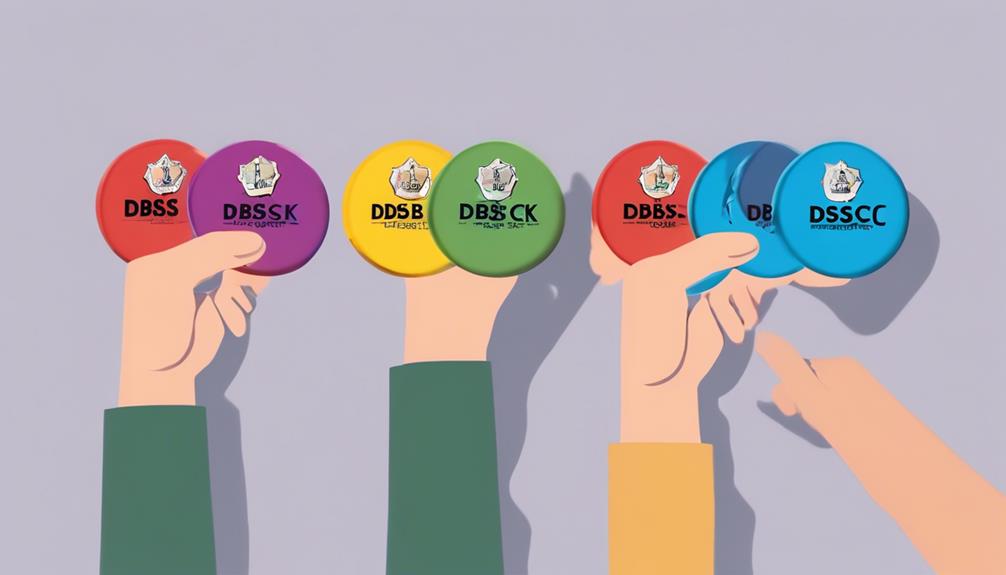Understanding the distinction between Basic and Standard DBS Checks is essential for organizations and individuals navigating background screening processes. The level of information provided in each type of check can significantly impact decision-making processes, especially when considering roles with varied responsibilities and trust levels.
By recognizing the nuances between these two types of checks, stakeholders can make informed choices that align with their specific needs and requirements. This differentiation is not just about the depth of information but also about the implications it carries for ensuring safety, compliance, and overall suitability in various professional settings.
Key Takeaways
- Basic DBS Checks reveal unspent convictions only.
- Standard DBS Checks include spent and unspent convictions.
- Standard checks are vital for roles like healthcare and legal sectors.
- Basic checks offer a snapshot, while standard checks provide a comprehensive criminal record review.
Overview of Basic DBS Check
Basic DBS Checks, also known as Basic Disclosure and Barring Service checks, provide a fundamental overview of an individual’s criminal record. These checks reveal only unspent criminal convictions and conditional cautions, making them the least detailed type of disclosure available. Individuals in job roles not eligible for Standard or Enhanced disclosures often request Basic DBS Checks. Industries such as construction and hospitality commonly utilize these checks due to their suitability for positions requiring only a minimal level of background checking.
Basic DBS Checks serve as a useful tool for employers looking to assess the basic criminal history of potential employees. They offer a snapshot of an individual’s unspent convictions and conditional cautions, allowing organizations to make informed decisions when hiring for roles that do not require a more thorough background check. While Basic DBS Checks may not provide a comprehensive overview of an individual’s entire criminal record, they offer a quick and accessible way to verify key information for certain job roles.
Understanding Standard DBS Check Scope
Exploring the comprehensive nature of Standard DBS Checks reveals a detailed examination of an individual’s criminal history, encompassing both spent and unspent convictions, cautions, reprimands, and final warnings in the UK. This thorough scrutiny ensures that a wide range of past misconduct is brought to light, providing valuable insights for employers and organizations assessing an individual’s suitability for certain roles.
To better understand the scope of Standard DBS Checks, consider the following:
- In-depth Criminal Record Review: Standard checks delve deep into an individual’s background, offering a holistic view of their involvement with the criminal justice system.
- Direct Information Sourcing: The Disclosure and Barring Service obtains information for Standard DBS Checks directly from the Police National Computer, ensuring accuracy and reliability in the disclosed details.
- Critical for Specific Job Roles: Standard checks are indispensable for positions such as administrators in medical centers, FCA-regulated roles, football stewards, and new solicitors where the safety and security of others are paramount.
Application Process for Basic Check
Understanding the significance of background checks in various professional settings underscores the importance of comprehending the application process for a Basic DBS Check. The application for a Basic DBS Check involves filling out an online form with personal details and providing identification documents. Accuracy in the information provided is crucial to prevent delays in processing the application. Individuals can request Basic Checks for purposes like job applications or licensing requirements. A fee payment is required for the Basic Check application, which can vary based on the chosen service provider. Once submitted, Basic DBS Checks are typically processed swiftly, often within a few days, with the certificate being sent to the applicant’s registered address.
| Application Process for Basic DBS Check | |||
|---|---|---|---|
| Step | Description | Requirement | Outcome |
| Fill out online form | Provide personal details | Identification documents | Swift processing |
| Payment of fee | Varies based on provider | Accurate information | Certificate sent promptly |
| Submit application | Job applications | Timely submission | Certificate at registered address |
In-depth Analysis of Standard Check
The Standard DBS Check provides a comprehensive overview of an individual’s criminal record, including both spent and unspent convictions, cautions, warnings, or reprimands.
This level of check is crucial for roles that involve a high level of trust and responsibility, such as those in healthcare, finance, sports, and legal sectors.
Employers and organizations must request Standard Checks for their employees to ensure thorough vetting processes are in place.
Standard Check Overview
When delving into the intricacies of a Standard DBS check, one discovers a comprehensive record detailing both spent and unspent convictions, cautions, reprimands, and final warnings within the UK.
Standard Check Overview:
- Standard checks provide a thorough background screening for individuals working in various sectors, including healthcare, finance, sports, and legal professions.
- These checks are crucial for ensuring the suitability of candidates for specific roles, safeguarding vulnerable populations, and upholding industry regulations.
- The information disclosed in a Standard DBS check is sourced directly from the Police National Computer, offering employers a comprehensive view of an individual’s criminal history and conduct.
Key Information Included
Included within a Standard DBS Check are detailed records of both spent and unspent convictions, cautions, reprimands, and final warnings within the United Kingdom, sourced directly from the Police National Computer by the Disclosure and Barring Service (DBS).
This thorough examination of an individual’s criminal history provides employers with vital information to make informed decisions regarding the suitability of candidates for certain roles. Job positions such as administrators in medical centers, FCA regulated positions, football stewards, and new solicitors commonly require Standard Checks due to the nature of their responsibilities.
These checks play a significant role in ensuring workplace safety, regulatory compliance, and the protection of vulnerable individuals, making them an essential tool for organizations in various sectors.
Relevance of Basic Check Details
Basic Check details are crucial as they only reveal unspent criminal convictions and conditional cautions, providing employers with pertinent information to make informed decisions.
Understanding the scope of Basic Checks helps industries like construction and hospitality ensure the safety and suitability of their workforce.
Ultimately, decision-making based on these checks can significantly impact hiring processes and organizational risk management strategies.
Basic Check Information
Revealing only unspent criminal convictions and conditional cautions, Basic DBS Checks are crucial in assessing an individual’s suitability for specific roles in various industries. When considering Basic Check Information:
- Relevance: Basic checks provide employers with essential information on an individual’s current criminal record status, helping them make informed decisions regarding job suitability.
- Industry Use: Industries such as construction and hospitality commonly request Basic DBS Checks to ensure the safety and security of their workplaces and customers.
- Cost-Effectiveness: Opting for Basic DBS Checks proves to be the most economical choice for employers seeking to obtain necessary criminal record details while staying within budget constraints.
Scope of Basic Checks
In evaluating the extent of information provided by Basic DBS Checks, it is essential to recognize their inherent limitations compared to more comprehensive disclosure levels. Basic DBS Checks only reveal unspent criminal convictions and conditional cautions, making them less detailed than Standard or Enhanced disclosures.
While these checks are commonly requested in industries such as construction and hospitality, they are best suited for roles where a basic criminal record check suffices. Understanding the scope of Basic Checks is crucial for employers and organizations to make informed decisions when assessing individuals for certain positions.
It is important to note that Basic checks are the least detailed type of DBS check available, providing a limited but essential snapshot of an individual’s criminal history.
Decision-Making Based on Checks
Employers rely on the information gleaned from Basic DBS Checks to assess the criminal record relevance of applicants for specific job roles. Decision-making based on Basic Check details is crucial for determining an individual’s suitability for a position.
To achieve this, employers:
- Consider the disclosed unspent convictions to gauge the individual’s trustworthiness and suitability for the role.
- Use the Basic Check information as a key factor in assessing the potential risks associated with hiring a particular applicant.
- Make informed recruitment decisions for low-risk job roles based on a thorough understanding of the Basic Check details.
Importance of Standard Check Accuracy
The accuracy of Standard DBS Checks is a fundamental element in assessing an individual’s criminal background comprehensively and making well-informed decisions. Standard Checks play a crucial role in revealing both spent and unspent convictions, providing a complete picture of an individual’s criminal history.
Ensuring the accuracy of Standard Checks is essential for making informed decisions, particularly in roles where safety and compliance are paramount. Inaccuracies in these checks can result in overlooking vital information that may have significant implications for the safety of vulnerable populations and the overall working environment.
Employers heavily rely on the accuracy of Standard DBS Checks to evaluate an individual’s suitability for specific roles, ensuring that they are placing the right candidates in positions of trust. Therefore, accurate Standard Checks are not only beneficial for the individual being assessed but also for safeguarding others and maintaining a secure environment.
Limitations of Basic Check Results
Ensuring a comprehensive understanding of an individual’s criminal background necessitates acknowledging the limitations inherent in Basic DBS check results. Basic checks provide only a partial view of an individual’s criminal history, primarily focusing on unspent convictions and conditional cautions. This limited scope can pose challenges in assessing an individual’s suitability for certain roles, as crucial information such as spent convictions is excluded from the report.
Limitations of Basic Check Results:
- Lack of Comprehensive Insight: Basic checks do not offer a holistic view of an individual’s criminal past, potentially leaving out vital information that could be relevant to specific positions.
- Insufficiency for Sensitive Roles: Employers seeking candidates for roles involving high levels of responsibility or access to sensitive information may find Basic check results insufficient in evaluating an individual’s background thoroughly.
- Need for Enhanced Disclosure: Positions requiring a deep understanding of an applicant’s criminal history often necessitate more detailed disclosure provided by Standard DBS checks over Basic checks.
Compliance Requirements for Standard Check
Compliance with Standard check requirements is essential for candidates applying to roles within regulated sectors. Standard DBS checks are crucial for positions where individuals will be working with vulnerable populations or handling sensitive information. The table below outlines key compliance requirements for a Standard check:
| Compliance Requirement | Description | Importance |
|---|---|---|
| Application Form | Candidates must complete the appropriate application form accurately and provide all necessary information. | Essential for processing |
| ID Verification | Valid identification documents must be presented to verify the applicant’s identity. | Prevents fraudulent activities |
| Consent Form | Candidates need to sign a consent form allowing the DBS to perform the necessary checks. | Ensures legal compliance |
Adhering to these compliance requirements ensures a smooth and efficient Standard DBS check process, helping organizations make informed decisions when hiring individuals for sensitive roles.
Conclusion
In conclusion, distinguishing between Basic and Standard DBS Checks is essential for understanding the level of detail provided in each type of check.
Basic checks reveal unspent criminal convictions, suitable for low-risk positions, while Standard checks include both spent and unspent convictions, typically required for roles with higher responsibilities.
It is crucial for individuals and organizations to adhere to the appropriate check to ensure accurate and efficient screening processes.



